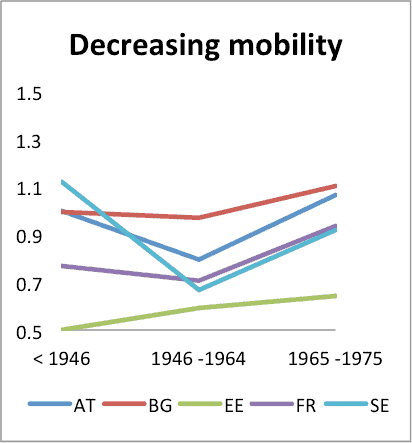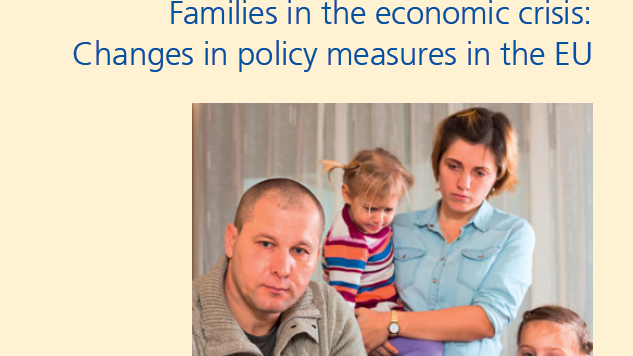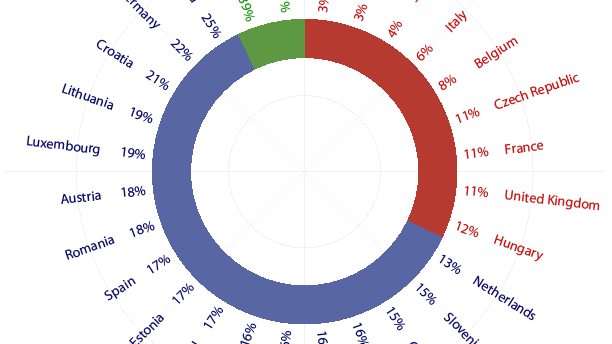
Blog post -
Does social background determine life chances in Europe?
In this blog piece, originally posted on Social Europe, Eurofound Research Manager Anna Ludwinek looks at new research that shows that younger Europeans are likely to have fewer opportunities for upward social mobility than preceding generations.
Equality of opportunity and upward social mobility are important aspects of the European social model. Until quite recently concerns about rising inequalities were often countered by assurances about protecting social mobility, and the assertion that an individual’s status is mainly down to their work-ethic rather than the results of parental wealth, so anyone can enjoy economic success and social progress in Europe. Recent evidence, however, shows a determinant role still for social background.
In the past upward social mobility relied on economic growth – the well-known “rising tide that raises most boats” concept – which meant better overall living standards: or ‘absolute mobility’.
Today’s Europe could not be more different. In times of sluggish growth, upward social mobility relies much more on a relative change in status: so called ‘relative social mobility’. For the first time in decades there is widespread concern that the younger adult generations will have fewer opportunities for upward mobility than today’s older ones. This concern reaches further and applies not only to those on low incomes but also to the middle classes, albeit with rather different characteristics in different EU Member States. Widening income and social inequalities have necessitated a fresh look at equal opportunities and the transmission of (dis)advantage in Europe.
But are these concerns justified? What are the patterns of social mobility and how have they changed in recent decades? Eurofound’s research provides new evidence on social mobility and examines to what extent family background determines an individual’s prospects. It also maps out the most pronounced barriers to social mobility, and reviews relevant policies that promote equal opportunities.
The report looks at absolute social mobility or the extent of broader occupational change and societal progress as well as relative social mobility which measures chances of moving (up or down) between occupational classes.
Analysis of the European Social Survey shows that there has been an improvement in relative social mobility over time and also a certain degree of convergence in relative mobility across Europe, but social mobility has not increased everywhere. Although it rose in most countries from the generation born before 1946 to the baby boomer generation (born 1946-1964), the picture after this is much more complex: in some countries social mobility has been decreasing (for example Austria, Bulgaria, France and notably Sweden and, to a lesser degree, Germany, Spain and Hungary) for the youngest generation. In several countries, meanwhile, social mobility has continued to increase across the board, for example Denmark, Finland and the Netherlands.


Social mobility by cohorts for men and women by country. Source: ESS, waves 1–5, covering 2002–2010; EF own calculations.
The research also shows that it is important to examine patterns of social mobility for men and women separately as the overall country patterns hide gender differences. In several countries it is men, especially those of Generation X, that have started to experience decreasing levels of social mobility: this is the case in the UK but also in France, Sweden, Austria, Estonia and Bulgaria. In contrast, social mobility among men has increased in Germany and Spain as well as in those countries where overall levels have been high for both sexes (the Netherlands, Denmark, Finland, Slovakia, Belgium and Greece).

Patterns of social mobility in the UK by gender
Although relatively few people in Europe are talking explicitly about ‘social mobility’, many are expressing practical and political doubts about a ‘fair society’ – one in which people have equal chances of enjoying good living standards and access to resources/services such as finance and childcare. Research confirms that social background continues to play a significant role, even in the most egalitarian Member States. Social parameters begin before a child is born and continue with the transmission of (dis)advantage in a number of ways, such as parenting skills and social capital during a child’s early and school years and their educational attainment and non-cognitive skills by the time they reach working age. Access, availability and quality of public services are key in levelling the playing field, but there continues to be a vast difference in the provision of these services both between and within European countries.
Quality childcare can be an important factor in supporting social mobility from an early age but the cost associated with early education and childcare can be prohibitive in a number of countries. This extends to primary and secondary education as young people from affluent backgrounds can attend private schools, or live in the catchment area of high-performing schools. Cost barriers to quality education are more prevalent in countries with fee-paying schools such as the UK, Ireland and France. Even when there are no direct financial barriers, high-attaining schools are generally located in more affluent areas. Discrimination, nepotism and social networks prevail as important factors limiting social mobility, with women and people from minority backgrounds finding themselves most adversely affected. In terms of the labour market, women and people from minority backgrounds are still less likely to gain access to certain jobs. On top of discrimination, nepotism and social networks still clearly advantage certain groups of people in accessing specific occupations in many EU countries.
The place where someone lives can also have a profound impact on their chances of upward mobility. Increased residential and regional segregation, mainly by income or economic situation, has become a feature of most urban areas in the majority of Member States. Factors such as distance from employers and universities can have a substantial impact via transport and housing costs on students’ aspirations and progression routes.
So what can policymakers do to promote upward social mobility? When we look at equal opportunity initiatives taken in countries we can see that quality of teaching and access to education is important. Within childcare and early education policies efforts have been made to improve curriculum quality and ease access, to pay attention to vulnerable groups and even to make childcare mandatory. Similarly, in mainstream education more attention has been paid to teaching quality, particularly in relation to vocational education and training. Policymakers have also started to recognise the importance of good relations between school and family and have put in place programmes aimed at improving the family environment and parenting skills as well as those aimed at promoting more inclusive environments, including moving away from segregated schools.
Perhaps the most important thing to take away from this new research is that we need to think more holistically from a life-cycle perspective when designing policies for improving equal opportunities and promoting upward social mobility. These ideally should start before birth and extend through childcare and school years into working life. This could also help to address widespread feelings of social exclusion and injustice now, especially when deep-rooted structural changes have contributed to widening inequalities in European countries.
Download the report: Social Mobility in the EU





